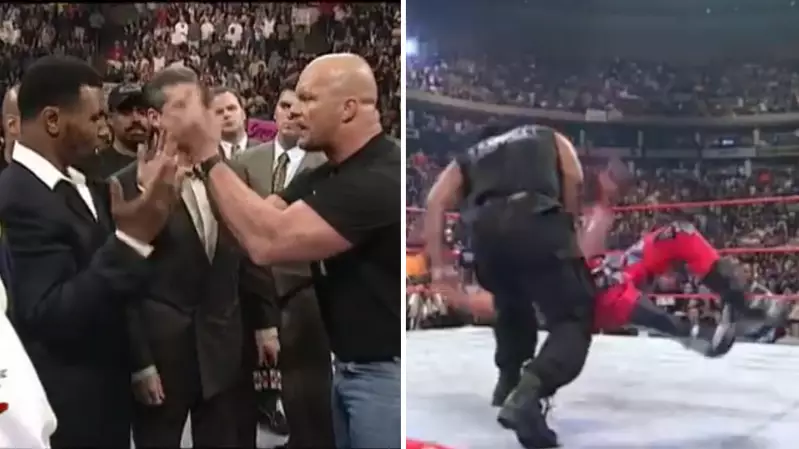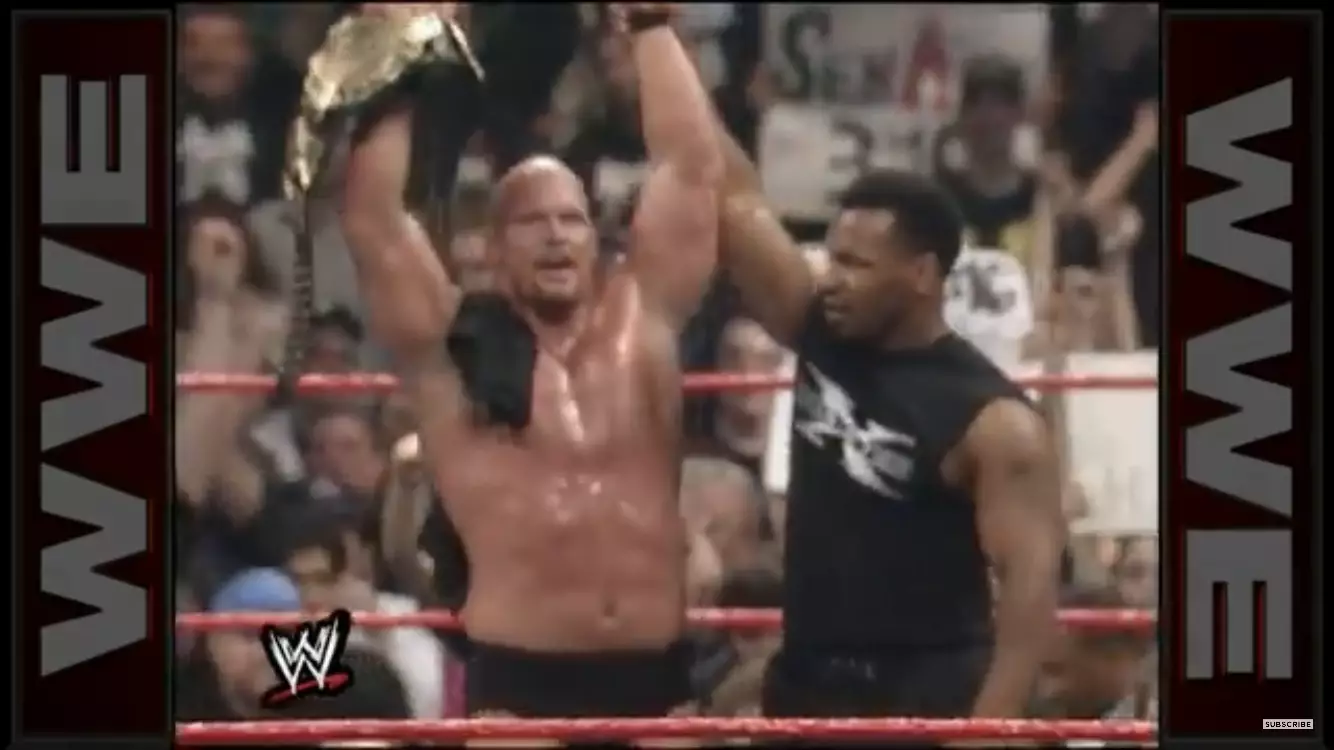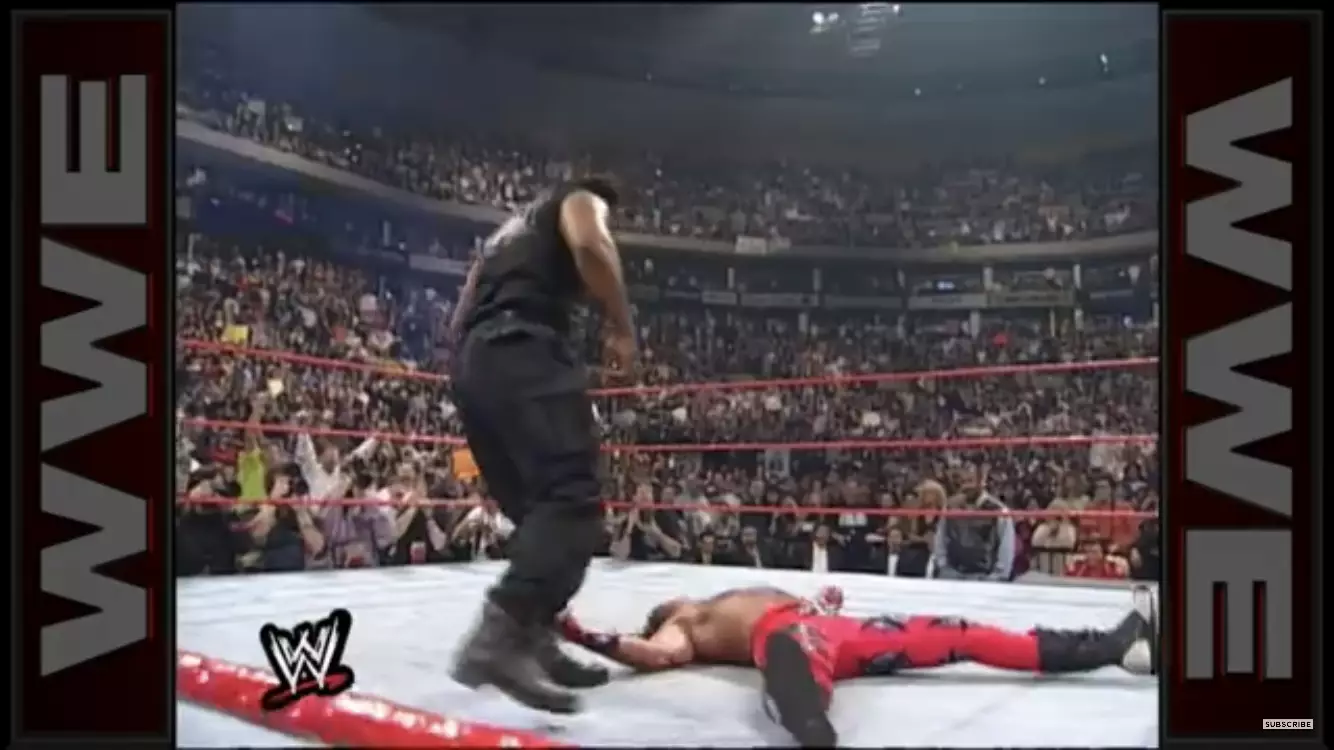
By Alex Reid
When Mike Tyson shockingly bit a chunk out of Evander Holyfield's ear, leading to his disqualification in their 1997 heavyweight mega-fight, dollar signs popped into Vince McMahon's eyes.
McMahon's WWE (then titled the WWF) was on the ropes. It was being pummelled in the Monday night ratings war by rivals WCW - which boasted household names such as Hulk Hogan - and had lost its position as America's top wrestling company.
Advert
One advantage the WWE had by late 1997 was the industry's hottest new star, Stone Cold Steve Austin. But it took a chaotic brawl with "the baddest man on the planet" Tyson to give trash-talking Austin the mainstream platform he urgently needed.
Iron Mike was stripped of his boxing license following the Holyfield debacle. Yet he was still a megastar - one with nothing to do. McMahon saw his opportunity and pounced, paying Tyson a whopping $3.5m to enter his wrestling organisation.
Lavish spender Tyson, reportedly down to his last $150,000 despite the millions he'd made in his career, was delighted. After watching the January 1998 Royal Rumble in the crowd, Tyson made his memorable debut on the following night's Raw show. Welcomed to the ring by a toadying Vince - the WWE owner playing his exaggerated, villainous "Mr McMahon" character - Tyson's congratulatory showpiece was interrupted by the glass-shattering sound that marked Austin's entrance.
Advert
Tyson offered a handshake, Austin shot back with: "I ain't gonna shake your damn hand... I could beat you any day of the week, twice on Sunday" plus the dreaded two-fingered salute. Tyson responded with an impressively forceful shove and suddenly the ring was a melee of bodies as Tyson's entourage and a host of officials scrambled to keep the former heavyweight champ and the enraged redneck apart.

McMahon feigned despair at the free-for-all, while Jim Ross lost his mind on commentary, yelling: "All hell has broken loose... Tyson wants Austin! Austin wants Tyson!" The impact was immediate. Tyson's presence meant Raw narrowed the ratings gap to WCW's flagship TV show Nitro to the closest it had been since the two programmes had gone head-to-head, while mainstream media coverage of the ruckus went global.
It didn't matter that many in the media looked down their nose at Tyson's pro-wrestling involvement - all publicity was good publicity. Crucially, Tyson threw himself into the role with relish. Sure, he occasionally referred to his rival as "Cold Stone" Steve Austin, but Tyson - a big wrestling fan as a kid - seemed to be genuinely enjoying himself.
Advert
Joining heel faction D-Generation X, led by WWE heavyweight champion Shawn Michaels, Tyson crotch-chopped and antagonised the crowd with abandon. Another part of McMahon's masterplan was a New York press conference where Tyson's role in the forthcoming WrestleMania 14 was announced.
Despite the tease that Tyson would be fighting Austin, ensuring a packed presser, this was never the plan. Instead, Tyson would be a ringside enforcer for Stone Cold's bout with Michaels. If anyone was in any doubt about Tyson's importance to the promotion's success, the WrestleMania poster - which gave Tyson, Austin and Michaels equal billing - said it all.
Tyson's feud with Austin brought a fresh audience to a brash, charismatic wrestler more than a decade younger than WCW's stars such as Hogan and Macho Man Randy Savage. It told at the box office as WrestleMania 14 in March 1998 sold out (unlike the previous year's Mania), drawing over $1m in ticket sales in Boston.
Advert
Tyson's entrance was marked by boos and people chanting "Holyfield, Holyfield!" Yet the boxer restrained himself from savaging any fan ears and his involvement was minimal until it came to the end of the main event. With the referee handily knocked down, Tyson entered the ring to count Austin's pinfall of Michaels - then raise the new champ's hand.
Cameras flashed at ringside and McMahon knew that this image - of Tyson standing alongside his new star - would be the one splashed across the mainstream press worldwide. As a bonus post-bout payoff, Tyson got to throw a worked punch at a complaining Michaels - who sold the right hook so brilliantly that he worsened a serious back injury he'd carried into a fight.

That injury kept Michaels out for another four years, but the WWE had scored a massive hit with WrestleMania 14. Boosted by Tyson's presence, it grossed over $11m in US pay-per-view sales making it the biggest money-spinning show the WWE had ever out on.
Advert
More importantly, it had strapped a rocket to Austin's popularity and launched a lucrative new era. By mid-1998, Raw was regularly beating Nitro in the ratings and by March 2001 - three years to the month since WrestleMania 14 - WCW was out of business.
Vince Russo, WWE's head writer from 1997 to 1999 has no doubts about the turning point. "This was the start of the Attitude Era: Vince's decision to bring Tyson in to WWE when he was suspended for biting Evander Holyfield's ear was freaking genius," he said in 2018. "Who knows what Vince spent? But that money catapulted WWE."
Influential industry magazine Power Slam later ranked Tyson's first showdown with Austin No 1 on a list of pro-wrestling's greatest ever angles. Austin would, alongside The Rock, lead the WWE to an unprecedented boom period.
To this day, Tyson recalls his time with the company fondly. Having felt ripped off by people in the boxing industry, Tyson was paid fair and square for his short WWE stint. He returned in 2010 to lay out Chris Jericho, then in 2012 when he was inducted into the company's hall of fame.
"I'm always willing to come back," Tyson said in 2018. "I love the WWE." As he provided the mainstream spark that helped the company turn its fortunes around 22 years ago, it's safe to say that the WWE feels the same way about Iron Mike.
Topics: Mike Tyson